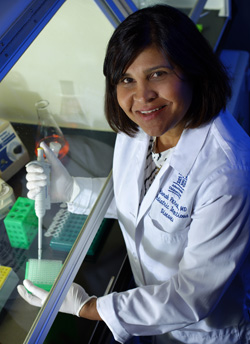Exciting results on the impact of very early combination antiretroviral therapy (cART) on the size of the HIV reservoir in children have been published by amfAR-funded investigators. Their findings, the scientists conclude, “may facilitate HIV-1 eradication strategies.”
 Dr. Katherine Luzuriaga Writing in the November issue of the Journal of Infectious Diseases, amfAR grantees Dr. Katherine Luzuriaga from the University of Massachusetts Medical School and Dr. Deborah Persaud of Johns Hopkins University, with colleagues from the National Institutes of Health, the University of California-San Diego, and Duke University report on eight children who were perinatally infected with HIV and then followed for up to 18 years. Four were treated with cART shortly after birth, within 2 to 11 weeks. The other four, in keeping with treatment guidelines in place at the time of their infection, did not receive cART until 6 to 15 years of age.
Dr. Katherine Luzuriaga Writing in the November issue of the Journal of Infectious Diseases, amfAR grantees Dr. Katherine Luzuriaga from the University of Massachusetts Medical School and Dr. Deborah Persaud of Johns Hopkins University, with colleagues from the National Institutes of Health, the University of California-San Diego, and Duke University report on eight children who were perinatally infected with HIV and then followed for up to 18 years. Four were treated with cART shortly after birth, within 2 to 11 weeks. The other four, in keeping with treatment guidelines in place at the time of their infection, did not receive cART until 6 to 15 years of age.
 Dr. Deborah PersaudThe children who were treated early had lower viral loads than those not given treatment until chronic infection had been established. But most striking was the fact that all four treated early had lower levels of proviral DNA—one measure of HIV reservoir size—along with decreased T-cell activation and absent or minimal anti-HIV immune responses, which is another indication of vanishingly small levels of virus in their bodies.
Dr. Deborah PersaudThe children who were treated early had lower viral loads than those not given treatment until chronic infection had been established. But most striking was the fact that all four treated early had lower levels of proviral DNA—one measure of HIV reservoir size—along with decreased T-cell activation and absent or minimal anti-HIV immune responses, which is another indication of vanishingly small levels of virus in their bodies.
This does not mean, of course, that the children treated early are cured. Virus still appears to be present, and they remain on cART. But starting cART so early after infection may have restricted the seeding of HIV reservoirs. A similar effect has been described in adults whose infection is caught, and treated, very early.
Drs. Luzuriaga, Persaud, and associates conclude that “life-long therapy may not be necessary for all individuals, particularly those who initiate cART during primary infection.”
Dr. Laurence is amfAR’s senior scientific consultant.